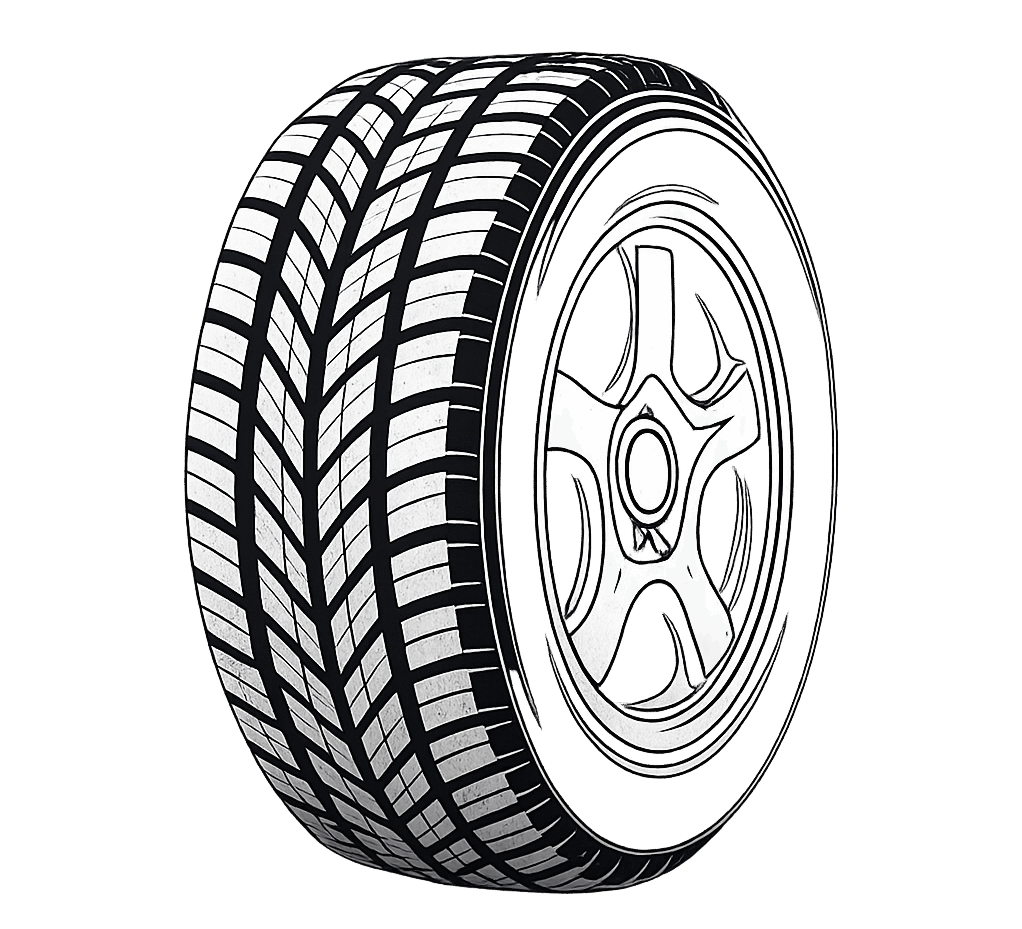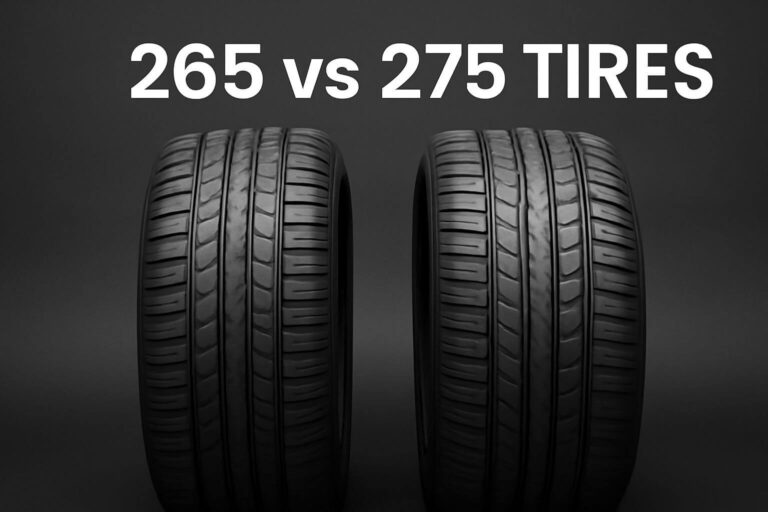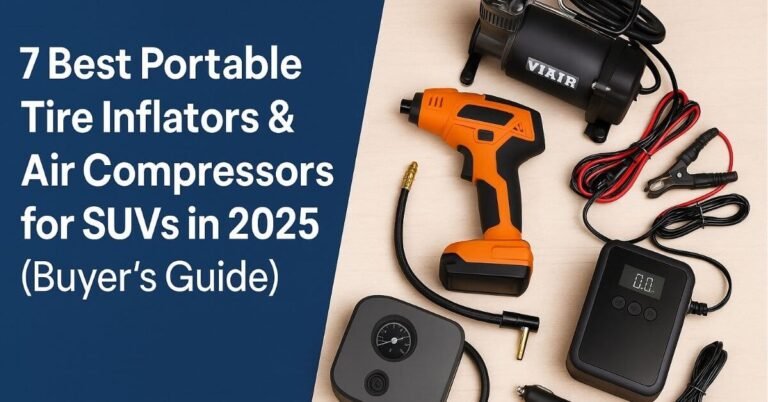Are Continental Tires Good for SUV? In-Depth Review & Expert Verdict
Last updated on August 15th, 2025
When it comes to finding the right tires for your SUV, the options can feel endless—and overwhelming. If you’ve been wondering, “Are Continental tires good for SUV?”, you’re not alone. Continental is one of the most recognized tire brands in the world, but does that reputation hold up when it comes to performance, comfort, and value for SUV drivers?
In this expert review, we’ll break down everything you need to know about Continental SUV tires—from real-world traction and snow performance to noise reduction and long-term durability. Whether you’re driving a luxury SUV, towing a trailer, or just commuting on wet roads, we’ll help you decide if Continental tires are the smart choice for your vehicle.
Let’s dive in and see whether Continental tires are truly worth the money—or just riding on their name.
What Makes a Tire Good for SUVs?
Not all tires are created equal—especially when it comes to SUVs. These vehicles are heavier, taller, and often built for more than just city cruising. That means your tires need to do more than just roll smoothly—they have to carry weight, handle different terrains, and keep you comfortable on every drive.
So, before we dive into whether Continental tires are good for SUVs, let’s talk about what actually makes a tire great for an SUV in the first place.
Key Features Every SUV Tire Should Have:
- High Load Capacity
SUVs are heavier than sedans and often carry passengers, pets, gear, or even trailers. Good SUV tires need a strong load rating to handle all that weight safely. - All-Season or All-Terrain Adaptability
Whether you’re driving on dry pavement, gravel roads, or in snowy weather, your tires should perform well year-round. Look for options labeled “all-season” or “all-terrain”—these are designed for versatility.
Tip: The Continental CrossContact LX25 is a popular all-season SUV tire that handles a mix of city and highway driving with ease. - Long Tread Life
A quality SUV tire should last between 50,000 and 70,000 miles, depending on how you drive. Long-lasting tread saves you money and means fewer tire replacements.
Real-life example: Many Continental SUV tire models come with a 60,000+ mile treadwear warranty. - Strong Wet and Snow Performance
Grip in rain and snow isn’t optional—it’s essential. Look for tires with deep grooves, siping (small cuts in the tread), and even the Three-Peak Mountain Snowflake (3PMSF) symbol if you live in colder areas. - Comfortable Ride with Low Road Noise
A good SUV tire should keep the cabin quiet and smooth, even at highway speeds. Some Continental tires use noise-reducing technology built into the tread to minimize that annoying road hum.
Pro tip: Tires like the Continental TerrainContact H/T are known for their quiet, smooth ride—great for families and road trippers.
Continental Tires Overview
Before we judge whether Continental tires are good for SUVs, let’s zoom out and see who’s behind the brand.
Is Continental a Good Tire Brand?
In short—yes, Continental is one of the most trusted tire brands in the world.
Founded in Germany way back in 1871, Continental has over 150 years of tire-making experience. Today, it’s one of the top five global tire manufacturers, competing with giants like Michelin, Bridgestone, and Goodyear.
So, what sets Continental apart?
- Innovation is their game.
They’ve developed cutting-edge technologies like:- EcoPlus™ Technology – boosts fuel efficiency and extends tread life
- ContiSeal™ – seals punctures automatically (a lifesaver on road trips)
- ContiSilent™ – reduces interior road noise for a smoother, quieter ride
- EcoPlus™ Technology – boosts fuel efficiency and extends tread life
- Automakers trust them.
Continental is a go-to Original Equipment (OE) supplier for brands like:- BMW
- Audi
- Mercedes-Benz
- Porsche
This is a strong trust signal—if high-end carmakers rely on Continental tires from the factory, that says something.
- BMW
- Tested and proven.
Their tires regularly score high in independent tests from respected sources like Tire Rack, Consumer Reports, and Auto Bild.
So yes, if you’re wondering “Is Continental a good tire brand?”—the answer is a confident yes.
Are Continental Tires Expensive — And Why?
Let’s be honest: Continental tires aren’t the cheapest option out there. In fact, they often cost more than average.
But there’s a reason for that.
Price vs. Premium Competitors
When comparing Continental to other top-tier brands like Michelin, Pirelli, or Bridgestone, the price is often in the same ballpark. You’re paying for quality, performance, and longevity—not just a name.
- For example:
- A Continental CrossContact LX25 (for SUVs) may run you around $180–$220 per tire.
- A similar Michelin Defender LTX M/S might cost $190–$240.
- A Pirelli Scorpion Verde all-season SUV tire can land in the $200+ range.
- A Continental CrossContact LX25 (for SUVs) may run you around $180–$220 per tire.
Why Are Continental Tires So Expensive?
Several key reasons:
- Precision German engineering – Their tires are designed and tested under strict European standards.
- Advanced R&D investment – Continental spends heavily on tire innovation, safety testing, and eco-friendly materials.
- Premium materials and build quality – Better rubber compounds, longer treadwear, and performance-enhancing designs all cost more to produce.
And don’t forget—many of their tires come with long treadwear warranties (60,000–70,000 miles), which adds long-term value.
So, while Continental tires may be on the pricier side, many SUV owners feel the performance and durability are well worth the cost—especially when compared to constant replacements or noisy, underperforming tires.
Next up: Let’s see how Continental tires actually perform for SUVs in the real world.
Are Continental Tires Good for SUVs? Real-World Use Cases
So far, we’ve looked at the brand’s background and what makes a great SUV tire. Now let’s get into the real-world stuff—how do Continental SUV tires actually perform where it matters?
Let’s break it down by key performance areas:
On-Road Comfort & Road Noise
If you do a lot of highway or city driving, this is where Continental really shines. Models like the CrossContact LX25 and TerrainContact H/T are designed for quiet, cushioned rides with stable handling.
Real-world feedback:
Drivers often praise the LX25 for its smooth ride and impressive road silence—even at higher speeds. The Continental TerrainContact H/T, while built for tougher conditions, still keeps things quiet thanks to ContiSilent™ technology.
Consumer Reports and Tire Rack user reviews also back this up. Many SUV owners report reduced cabin noise and better ride comfort compared to older OEM tires.
👍 Pros:
- Exceptionally quiet ride (great for families and commuters)
- Smooth handling on highways and in the city
- Great treadwear and fuel efficiency
👎 Cons:
- Not the best option for aggressive off-road use
- Price is a bit higher than average all-season tires
Off-Road and All-Terrain Performance
For SUV owners who enjoy towing, camping, or exploring back roads, Continental TerrainContact A/T is the go-to model.
It’s not an extreme mud tire, but it offers solid grip on gravel, dirt, and light trails—without giving up on-road comfort.
Towing tip: Many truck-based SUVs (like a Toyota 4Runner or Ford Expedition) run TerrainContact A/T tires when pulling campers or boats. The tire’s sidewall strength and traction hold up well under load.
What it does best:
- Handles light off-roading and unpaved roads with ease
- Works well for weekend adventures or mild overlanding
- Quiet and comfy for daily driving—unlike many chunky off-road tires
Snow, Rain, and All-Season Grip
Worried about winter driving? Many Continental SUV tires carry M+S (Mud + Snow) ratings, and some even earn the Three-Peak Mountain Snowflake (3PMSF) symbol—meaning they meet official snow traction standards.
Models like the CrossContact LX25 and TerrainContact A/T offer dependable grip in rain and light snow.
- In Tire Rack’s winter performance tests, the LX25 came close to Michelin Defender LTX M/S in snow braking and hydroplaning resistance.
- Compared to Nokian (a snow tire specialist), Continental might not win in deep snow, but it strikes a better year-round balance.
If you live somewhere with light-to-moderate winters, Continental all-season SUV tires will likely get the job done without needing a full winter set.
Luxury SUV Compatibility
Driving a luxury SUV like a BMW X5, Audi Q7, or Mercedes GLE? You’re probably looking for tires that deliver a refined ride, low cabin noise, and great high-speed handling.
Continental designs many of its SUV tires with premium ride quality in mind. That’s why so many European automakers install them as OEM equipment.
What luxury SUV drivers love:
- Quiet and stable ride at highway speeds
- Confident cornering and braking on dry roads
- Long-distance driving comfort—great for road trips
Plus, Continental tires often include ContiSilent™ noise-dampening foam to make your ride feel even more high-end.
Yes, Continental tires are good for SUVs—and not just on paper. From smooth commutes to weekend adventures, they offer strong all-around performance for comfort, traction, and durability.
Value and Longevity: Are Continental Tires Worth the Money?
When shopping for SUV tires, the big question often is: Are Continental tires worth the money? They might cost more upfront, but what about long-term value?
Let’s break it down.
Long Tread Life Means More Miles for Your Money
Continental tires are known for their durability. Many SUV models, like the CrossContact LX25, come with a 60,000-mile treadwear warranty. That’s a solid lifespan compared to budget tires that might only last 30,000 to 40,000 miles.
Real-world tip: If you drive about 12,000 miles a year, that warranty means you could get five years or more out of your tires—saving you money on replacements.
Quality Materials and Smart Design
Continental uses advanced rubber compounds and tread designs to balance grip and wear. This means your tires won’t wear out too fast but still perform well in wet, dry, and snowy conditions.
Their EcoPlus™ technology helps improve fuel efficiency too, which can save you a few extra bucks at the pump over time.
Cost vs. Performance
Yes, Continental tires are often pricier than some competitors. But the quality, safety features, and longer tread life often justify that extra cost.
For example, an SUV driver replacing tires every three years might spend more in the long run than someone who chooses Continental and gets five or six years out of a set.
Real-World User Feedback
Many SUV owners say Continental tires feel like a good investment. They notice better handling, quieter rides, and fewer worries about tread wearing out too fast.
In summary: If you’re asking “Are Continental tires worth the money?”, the answer is yes—for drivers who value comfort, safety, and long-term savings.
Continental SUV tires may cost a little more at the start, but their quality and longevity often pay off in the end.
Continental vs Other Top Brands for SUVs
Trying to choose between Continental, Michelin, Bridgestone, and Pirelli for your SUV? Let’s do a quick head-to-head comparison to help you decide what fits your driving style, terrain, and budget.
Continental vs Michelin
Michelin is often seen as the gold standard, especially for comfort and long tread life.
- Continental offers a smoother, quieter ride at a slightly lower price.
- Michelin edges out with slightly longer wear and better fuel efficiency.
✅ Best for: Daily commuters who want quiet, refined rides with high mileage.
Continental vs Bridgestone
Bridgestone tires are known for rugged durability and tough sidewalls—great for harsh roads.
- Continental offers more comfort and better road noise control.
- Bridgestone might hold up better if you drive over potholes or rougher rural roads regularly.
✅ Best for: SUV drivers dealing with rough pavement, gravel, or towing.
Continental vs Pirelli
Pirelli focuses on performance. Think sporty handling and high-speed stability.
- Continental delivers a more balanced all-around package—traction, comfort, and quietness.
- Pirelli often outperforms in dry handling but may sacrifice tread life.
✅ Best for: Sporty SUVs, luxury models, or drivers who enjoy spirited driving.
Quick Brand Comparison: Pros & Cons
| Brand | Pros | Cons |
| Continental | Smooth ride, great traction, quiet, good value | Not the cheapest, not for extreme off-road |
| Michelin | Long tread life, excellent fuel economy | Premium pricing |
| Bridgestone | Very durable, strong sidewalls | Can be noisier, stiffer ride |
| Pirelli | High performance, sporty feel | Shorter lifespan, not ideal for snow |
Pick the Right Tire for Your SUV Use Case
- Daily Driver: Go with Continental or Michelin for ride comfort and low road noise.
- Winter Terrain: Choose Continental or Bridgestone—both have strong snow-rated options.
- Towing & Rough Roads: Bridgestone stands out for strength and load durability.
- Luxury or Performance SUV: Pirelli if you love cornering; Continental if you want quiet comfort.
Continental holds its own against these big names—especially when it comes to value, all-season performance, and everyday comfort.
Conclusion
So, are Continental tires good for SUVs? The answer is a confident yes. They strike a great balance between comfort, safety, and long-lasting performance. Whether you’re tackling daily city driving, snowy roads, or light off-roading, Continental offers reliable options that suit many SUV drivers’ needs.
If you value a quiet ride, solid traction, and tires that go the distance, Continental should definitely be on your shortlist.
Frequently Asked Questions (FAQ)
Are Continental tires worth buying for SUVs?
Yes, Continental tires offer excellent value with strong performance, long tread life, and a comfortable, quiet ride—making them a solid choice for most SUV drivers.
Do Continental SUV tires work well in snow and ice?
Many Continental SUV tires have M+S and 3PMSF ratings, providing reliable traction in light to moderate snow and icy conditions.
How long do Continental tires typically last?
Continental SUV tires often come with treadwear warranties up to 60,000 miles, meaning they can last around five years or more with regular driving.
What are the quietest Continental tires for SUVs?
The CrossContact LX25 and TerrainContact H/T are known for their quiet, comfortable rides thanks to noise-reducing technologies like ContiSilent™.
Are Continental tires good for towing heavy SUVs?
Yes, models like the TerrainContact A/T offer strong sidewalls and durability that support towing and heavier loads well.
Do Continental tires wear quickly?
No, Continental tires generally have good tread life thanks to advanced rubber compounds and smart tread designs.
Are they more expensive than Michelin or Bridgestone?
Continental tires are competitively priced, often slightly less expensive than Michelin but similar to Bridgestone, reflecting their quality and performance.









As I website possessor I conceive the articles here is real good, thanks for your efforts.
I was very pleased to find this web-site.I wanted to thanks for your time for this wonderful read!! I definitely enjoying every little bit of it and I have you bookmarked to check out new stuff you blog post.